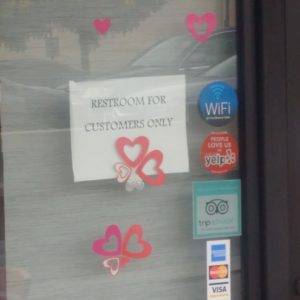
Arrests for public urination/defecation are a fundamental tool in the war against homeless people in Los Angeles, as well as being a major part of the BID Patrol’s work in Hollywood. In 2015, for instance, the BID’s data shows that about 8%1 of the arrests that Andrews International made across the two HPOA BIDs2 were for public urination/defecation, which is a violation of LAMC 41.47.2.
When the City Council passed LAMC 41.47.2 in 2003, they were roundly (and rightly) criticized by advocates for the rights of homeless people, who pointed out that it was inhumane to criminalize an activity that is necessary to sustain life without providing a practical alternative. My colleagues have written before about how Councilmembers responded to this by promising informally that it wouldn’t be enforced if there were no nearby public restrooms and by promising to install more public restrooms around the City. However, they failed to amend the actual statute, which has led to widespread abuse.3 And 13 years later there aren’t significantly more public restrooms.
However, there is another part of the public urination law, LAMC 41.47.1, which is never even mentioned in discussions of the issue, and yet it is not only relevant, but radically, transformatively relevant. It was adopted by the Council in 1988 and says:
If restroom facilities are made available for the public, clients, or employees, no person owning, controlling, or having charge of such accommodation or facility shall prohibit or prevent the use of such restroom facilities by a person with a physical handicap, regardless of whether that person is a customer, client, employee, or paid entrant to the accommodation or facility. Employee restrooms need not be made available if there are other restroom facilities available on the premises unless employee restroom facilities have been constructed or altered to accommodate the physically handicapped and such facilities are not available elsewhere on the premises.
This has the potential to change the entire conversation about public restrooms, public urination, and homelessness in Los Angeles.
Continue reading LAMC 41.47.1: This Seemingly Unknown Municipal Bathroom Law Could Change the Whole Public Urination Discussion in Los Angeles, but it has Never Been Used
